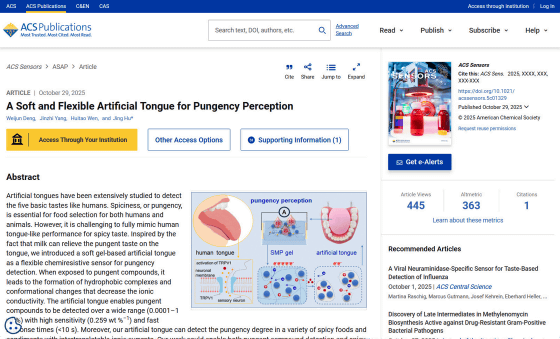An artificial tongue that can measure the spiciness of chili peppers and Tabasco sauces has been developed

Spicy dishes made with large amounts of chili peppers and other ingredients are popular with some enthusiasts, but it can be difficult for the chefs themselves to taste these dishes or the spicy condiments they use. To address this issue, a Chinese research team has developed an artificial tongue that can measure the spiciness of chili peppers and Tabasco sauce.
A Soft and Flexible Artificial Tongue for Pungency Perception | ACS Sensors

Synthetic tongue rates chillies' heat — and spares human tasters
https://www.nature.com/articles/d41586-025-03767-1
Artificial tongues (electronic tongues) that measure taste have existed for some time, and scientists have developed devices that use electronic sensors to detect sweet, sour, spicy, umami, and other flavors.
However, this time, a research team at the East China University of Science and Technology in China has developed an artificial tongue that can measure spiciness levels as accurately as possible, focusing solely on spiciness. Jing Hu, a chemical engineer at East China University of Science and Technology and co-author of the paper, argues that accurate measurement of spiciness is particularly important for food quality control.

The artificial tongue developed by the research team is made of a gel containing powdered milk,
When a spicy substance is exposed to the gel, the capsaicin, the spicy component, binds with the casein in the milk powder, forming a complex that blocks the flow of ions and causes a change in electrical current. By identifying this change in electrical current, the level of spiciness can be determined.
The research team was inspired by the mechanism by which milk neutralizes spiciness in order to develop the artificial tongue. Casein , a protein found in milk and yogurt, binds with capsaicin , the main component that gives chili peppers their spiciness, and reduces the spiciness perceived by the tongue .

To determine how the electrical current affected the level of spiciness, the researchers had the artificial tongue taste eight different chili peppers and rate their spiciness on a scale from 'normal' to 'dangerously hot' based on the electrical current change. To evaluate this scale, the researchers then used the artificial tongue to rate the spiciness of eight spicy foods, including chili powder and Tabasco sauce.
These ratings were compared with those of trained human taste testers, and the results showed good agreement between the artificial tongue and human ratings. 'This means that this device can be used to test spicy foods in place of the human tongue,' says Hu.
Hu and his colleagues aim to develop a more convenient, pocket-sized artificial tongue device in the future.
Related Posts:







